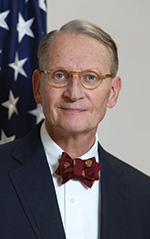Before Meyer, et al. v. U.S. Department of State: A 1996 Accessibility Milestone
A senior FSO opens up about the legal effort to gain consideration for members of the FS and their families with medical conditions.
BY PAUL M. CARTER JR.
On Jan. 17, 2023, the Department of State announced an agreement to settle the long-running Meyer, et al. v. U.S. Department of State class-action case concerning applicants to the Foreign Service with medical conditions. Under the settlement, the department will, among other things, cease requiring that applicants receive Class 1 medical clearances as a condition for hiring and broaden the concept of “worldwide availability” to accommodate candidates with medical conditions.
As we mark this milestone in the department’s observance of legal obligations and diversity principles, I would like to share my family’s case from more than a quarter century ago. Although not previously publicized, it was significant for the evolution of the State Department’s attitude toward people with disabilities and medical issues.
Indeed, as far as I know, our case was the first to crack open the department’s rigid position on worldwide availability for career candidates and their family members. Upon settlement of our case, State ended its long-standing policy of requiring that applicants’ family members receive Class 1, worldwide-available medical clearances and uncoupled the hiring of new Foreign Service applicants from the medical clearance status of family members.
For me personally, that earlier settlement meant that I could begin a career as a Foreign Service officer that would otherwise have been barred to me.
A Long Trek

The Carter family, Moscow 2000.
Courtesy of Paul Carter Jr.
We reached that point only after a lengthy trek through bureaucratic procedures and emotional highs and lows. Fulfilling a long-held dream, I passed the Foreign Service oral assessment in September 1994 and began the entry process, including the security clearance and medical examinations for myself, my spouse, and our daughter and son. Both children were born with congenital cataracts and had developed glaucoma as a result of corrective surgeries.
Their glaucoma was well controlled with eye drops, and our pediatric ophthalmologist was confident we could safely manage overseas. State’s Bureau of Medical Services (MED) disagreed, however, and in February 1995 determined the children were Class 5, unavailable for worldwide service. (At the time, preemployment candidates and family members could receive either Class 1 or Class 5 medical clearances; Class 2, post-specific clearances, were available only to currently serving officers and dependents.)
The decision surprised and disappointed us. We began a lengthy appeal process but met resistance at each stage from MED and the recruitment office of the Bureau of Human Resources (HR, now the Bureau of Global Talent Management). It was frustrating to know that the same officials who were so dead set against us would work hard to accommodate us if I were already serving. Some officials implied or outright accused us of being poor parents for trying to take our children abroad, despite the fact that we already had spent a year in the Soviet Union with our daughter in the mid-1980s on a scholar exchange. Others expressed concern about the potential costs to the department because of our children’s conditions.
The first step was informal consultations between our ophthalmologist and the assistant medical director (AMD) at State, then between my wife and me and the AMD. He was not persuaded, accusing the children’s ophthalmologist of having a “cavalier attitude” toward their conditions. We followed up with letters from other prominent pediatric ophthalmologists endorsing our plan. When that didn’t work, we requested a review of the MED decision by the Employment Review Committee (ERC), a panel of nonmedical State officials, who also denied our request, in March 1995.
Despite the ERC denial, things seemed to look up when the AMD contacted the ophthalmologist MED regularly consulted. I was told that he “enthusiastically” endorsed our proposed treatment/monitoring plan. The AMD would re-present our case to the ERC with a positive recommendation and was “very optimistic” about the outcome. Just before the meeting, however, his perspective again soured. He told us that in the current political environment, in which downsizing at State was the order of the day, the ERC was more likely than in the past to weigh my potential value as an FSO against potential problems with the children. His assessment of the ERC proved correct, and we received another denial in June 1995.
On the EEO Track
We then entered the equal employment opportunity (EEO) process and were assigned a counselor, who attempted to mediate a resolution. Our counselor spent hours discussing the case with the parties involved, as well as with various officials in the EEO office. The issue of “reasonable accommodation” under the Rehabilitation Act of 1973 and the Americans with Disabilities Act of 1990 often came up. Senior officials in HR’s recruitment office believed that the ERC process itself was evidence of the department’s efforts to offer reasonable accommodation. Others argued that the potential expense of the medevac of our children, if that ever became necessary, was beyond what could be considered reasonable.
The case was eventually brought before the ERC for a third time, in August 1995, with the same negative result (the four FSOs on the panel voted no, while the EEO lawyer and the handicap coordinator voted yes). The director of the recruitment office sent me a letter in September 1995 informing me of the ERC result and adding that my FSO candidacy would be terminated.
Down but not out, I filed an EEO complaint, which was accepted for investigation. It was around this time that we sought legal counsel. I was not a regular reader of the Metro Section of The Washington Post, but one day, by a happenstance that in hindsight seems providential, I read an article on the case of female guards at Lorton Prison and their representation by the D.C. Lawyers’ Committee for Civil Rights. We called the Lawyers’ Committee to request assistance. They evaluated the case and put us in touch with attorney Warren Asher, a skillful, methodical, and fervent advocate of disability rights with the prestigious firm of Wilmer, Cutler, and Pickering. Mr. Asher agreed to take the case pro bono in December 1995.
Indeed, as far as I know, our case was the first to crack open the department’s rigid position on worldwide availability for career candidates and their family members.
With Mr. Asher on board as representation, our role in managing the case decreased. We had to provide testimony; but, otherwise, the case slowly wound its way through the Equal Employment Opportunity Commission and reached the top of the Justice Department. Then, after months of alternating apprehension and cautious hope, we got a call from Mr. Asher in July 1996 with news that the department wanted to settle. He said the Justice Department had told State its case was very weak, and it needed to resolve the issue. Papers were quickly drawn up for signature. I agreed to keep the terms of the settlement confidential, but I can say that we never asked for anything other than the job.
I was assigned to the 80th A-100 class for incoming officers, which convened in September 1996—almost three years after I had passed the written exam. While I prepared to enter the class, we learned that a memo circulated in the department after our settlement changing the hiring policy: candidates’ employment no longer would be contingent on the medical conditions of family members. In addition, family members could henceforth receive Class 2 clearances during preemployment medical exams, though FSO candidates were still required to receive Class 1.
The Process of Historic Change
Although we had prevailed, Mr. Asher was disappointed that the State Department was not required to eliminate preemployment medical exams for candidates, as well as family members. Tragically, he succumbed to cancer within a year of the conclusion of our case. His efforts, however, though not meeting his own high standard of success, contributed to a historic change in how the State Department treated the family members of incoming officers. Almost 27 years later, the Meyer, et al. settlement reforming the policy of worldwide availability to accommodate persons with medical conditions goes a long way toward reaching his goal.
The case was a long, hard battle. Reading through the records while drafting this article, I was reminded how hopeless our predicament at times appeared. I also relived some of the stress and self-doubt my wife and I suffered as State MED and HR questioned our judgment and stonewalled our quest for fair and equal treatment. But it reminded us, too, of the people who saw the injustice in our case and provided us with so much help. I realized, as well, that the confidentiality agreement I signed as part of the settlement created a psychological barrier to my sharing the story all these years.
As I now approach age-out retirement as a Senior FSO, I can look back on a successful, productive, and rewarding career serving my country. Were it not for some luck, determination, and the help of a few intrepid allies, however, my opportunity to serve may have been snuffed out by discrimination, arrogance, and bureaucratic inertia. I will note in closing that, contrary to the department’s grave warnings, we only ever served at hardship posts; our children never had to be medevac’d for their eye conditions; and, now approaching middle age, they still enjoy healthy eyesight.
When sharing or linking to FSJ articles online, which we welcome and encourage, please be sure to cite the magazine (The Foreign Service Journal) and the month and year of publication. Please check the permissions page for further details.
Read More...
- “The Issue of Disability” by Francine Modderno, The Foreign Service Journal, January 1996
- “A Foreign Service Career—Blindness Didn’t Stop Me” by Roy Glover, The Foreign Service Journal, June 2022
- “Department of State Reaches Settlement Resolving Longstanding Claims of Disability Discrimination Relating to Its Worldwide Availability Requirement for Career Department of State Foreign Service Applicants,” Office of the Spokesperson Media Note, U.S. Department of State, January 2023




